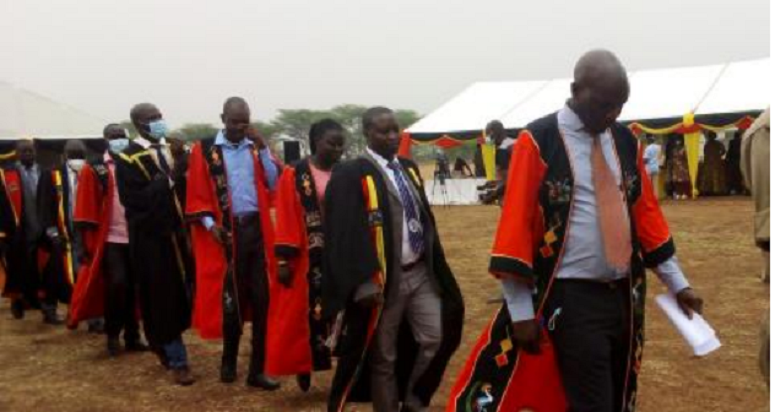Local Councilors during the regional council meeting at Moroto sports ground
Leaders in the Karamoja sub region have raised concerns over the low literacy levels afflicting the local councilors in their decision making.
The leaders who spoke to our reporter alleged that 80 percent of the local councilors cannot neither read nor write, and this has adversely affected their competence in decision making thus contributing to poor service delivery.
In desperation because government refused to set minimum qualifications for councilors, they now want interpreters to be hired for the councilors so they can know what is in official policy documents.
In July 2022, Moses Lomuria, the LC3 chairperson of Longaroe sub county in Kotido district banned the use of English as an official language at the office premises. Lomuria claimed that the councilors who speak English could be planning badly against his leadership since he does not understand the language.
Lomuria who does not have any academic qualification was voted as a sub county chairperson under the orders of the Elders who claimed it was a directive from their gods issued in the shrine.
Faith Nakut, the woman member of parliament for Napak district says it is very unfortunate to have councilors who cannot read and write and yet they are the body that makes decisions for the district.
Nakut noted that although it was necessary for all the councilors to have some academic qualifications, the government does not take the matter seriously and this gives everyone an opportunity to be absorbed into leadership offices.
She also revealed that lack of academic qualifications hinders the esteem of someone to present issues before the floor of council and in the process service delivery is affected.
“Our councilors have failed to do their work simply because they do not know what they are supposed to do, I’m worried because they are the backbone of the district,’’ Nakut lamented.
Nakut added that since the motion was sidelined from the floor of parliament, the local government should ensure that leaders who do not understand the language used are protected by providing interpreters to translate the budget before appending signature.
Paul Lokol, the chairperson LCV for Nabilatuk district says that he has always been frustrated by the way his councilors always present issues during council sessions while others prefer keeping quiet because they don’t know their role in the council.
Lokol says since there is no special academic qualification for local councilors, the ministry of local government was supposed to train councilors to understand their roles and build capacity but unfortunately it has never been implemented.
“The low literacy rate contributes to poor service delivery among the councilors because they find it hard to make decisions on reports presented using English,’’ Lokol reiterated.
Joseph Lobot, the chairperson LCV for Amudat district observed that most of the councilors at the district are not able to analyze information on their own because they can’t read and write.
Lobot says there is a need to embark on training and capacity building for local councils so they can know their roles and responsibilities.
He said it is unfortunate that most of the councilors are new in the system and the training is so necessary for them to understand how they are supposed to execute their duties.
The local councilors are members of an elected body that makes decisions on behalf of a local government through a formal meeting process. The council members have a duty to attend all council meetings to ensure that electors are adequately represented.
-URN





